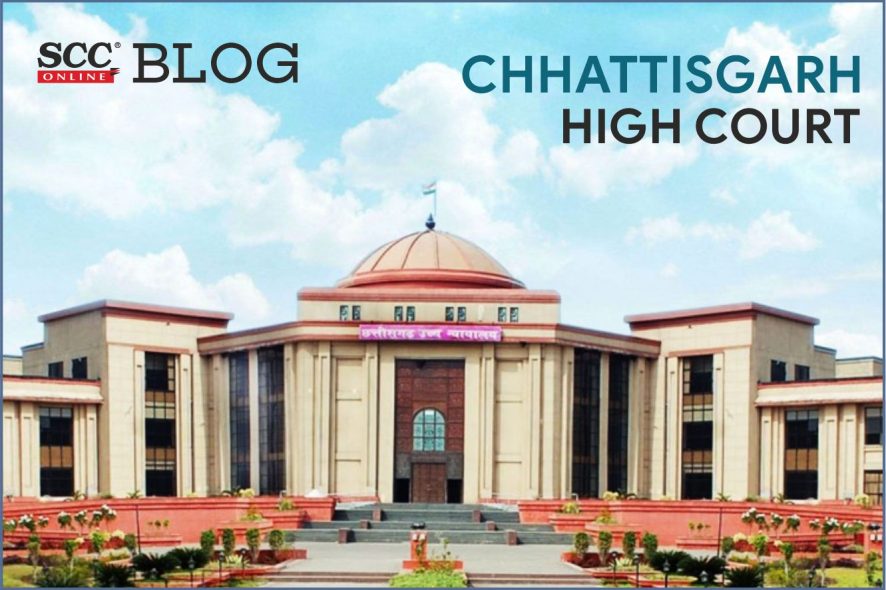Chhattisgarh High Court: In a writ petition filed under Article 227 of the Constitution of India, after being aggrieved by the order passed by Chhattisgarh Rent Control Tribunal (Tribunal), wherein the Tribunal has affirmed the order dated 13.02.2020 passed by the Rent Controlling Authority, Raipur (Authority), the division bench of P. Sam Koshy and Parth Prateem Sahu, JJ. has held that the open land which is not being used for agriculture purpose and has been given on lease for a particular period comes under the definition of ‘Accommodation’ under Section 2(i)(1) of Chhattisgarh Accommodation Control Act, 2011 (the Act of 2011).
In this case, the respondent leased out a portion of the property in favour of the petitioner and the lease/rent was executed for a period of 15 years. Thereafter, a fresh rent agreement was entered into for the period of 10 years. After the expiry of the lease in 2018, the respondent issued a notice of eviction under Section 12(2) read with Schedule-II Clause 11(h) of the Act of 2011. Despite the said notice, the petitioner did not evict the premises, thus, the respondent filed an application before the Authority seeking an order of eviction. The Authority has directed the petitioner to immediately vacate the said premises within a period of one month. Further, aggrieved by the said order the petitioner filed an appeal before the Tribunal, however, the Tribunal also has affirmed the order passed by the Authority. It is this order which is under challenge in the present writ petition.
The Court noted that the writ petition has been filed on three grounds:
- Since the agreement entered between the parties was not an agreement in consonance with the requirement as laid down under the Act of 2011, the provisions of the Act of 2011 would not be applicable.
- The provisions of the Act of 2011 also would not be attractive in the present case as it was only land which was leased out for rent by the respondent and the Act will only be applicable upon an accommodation/building and the land attached to the accommodation of the building.
-
The Indian Oil Corporation, of which the petitioner was a dealer, was a necessary party, and in the absence of the Corporation being made a party before the authorities the two proceedings deserve to be rejected on the ground of non-joinder of necessary party.
The Court concerning the first ground, observed that the said issue is no longer res integra in the light of a recent decision of the Division Bench of this Court in the case of Shrawan Kumar Saraf v. Ravikant Mishra WPC No.650 of 2020, wherein the Court held that “non adherence of the Chhattisgarh Rent Control Act, 2011 or for that matter the agreement between the parties not being in accordance with the Act would not debar under law to pursue his application before the Rent Controlling Authority”.
Further, the Court referred to the English and even Hindi version of the definition of an ‘Accommodation’ under Section 2(i) of the Act of 2011 that states, an accommodation “means any building or part of a building, whether residential or non-residential, leased out by the landlord to the tenant and includes open space, staircase, grounds, garden, garage and all facilities and amenities forming part of the agreement between them of any land which is not being used for agricultural purposes.” and observed that “a plain reading of the definition of an “accommodation”, more particularly the one in Hindi, would clearly reflect that the definition of accommodation is inclusive of any land which is not being used for any agricultural work”.
Thus, the Court viewed that, for the purpose of attracting the Act of 2011, all that is required is the lease deed executed in writing between the landlord and the tenant in respect of any building or a part of a building whether for residential or non-residential purpose and would also include any land which is not being used for agriculture purpose.
Moreover, the Court observed that another fact which needs to be appreciated at this juncture is that the earlier law governing the field i.e., the Chhattisgarh Accommodation Control Act, 1961 (the Act of 1961) also had the same definition of accommodation under Section 2(a) of the Act of 1961. Thus, the Court held that the provisions of the Act, 2011 would also be applicable upon the property taken on rent or lease, even if it is open land.
Further, concerning the third issue, the Court viewed that the rent agreement or lease deed was executed between respondent and petitioner, and Indian Oil Corporation was not involved at any point of time. Further, the proceedings having been initiated under Section 12(2) read with Clause 11(h) of Schedule-II, the application could have been filed only between the petitioner and the respondent and the dealership agreement entered between the petitioner and the Indian Oil Corporation would not be of much relevance when it comes to a lease/ rent agreement entered between the petitioner and the respondent. Thus, the dispute is between the petitioner and the respondent who are the tenant and the landlord.
Moreover, the Court observed that the lease between the petitioner and the respondent came to an end w.e.f. 04.04.2018. Thereafter, there has been neither any renewal of the lease/rent agreement nor any fresh agreement was entered between the parties. Thus, there is no further right available with the petitioner to assert any claim over the said property, coupled with the fact that notice of eviction has already been issued by the respondent, and directed the petitioner to vacate the premises and hand over possession to the respondent within a period of four months.
[Sourabh Fuels v. Suresh Kumar Goyal, 2022 SCC OnLine Chh 1634, decided on 16.09.2022]
Advocates who appeared in this case :
For Petitioner: Advocate Sabyasachi Bhaduri;
For Respondent: Advocate Pranjal Agrawal;
Advocate Vidhi Agrawal.







